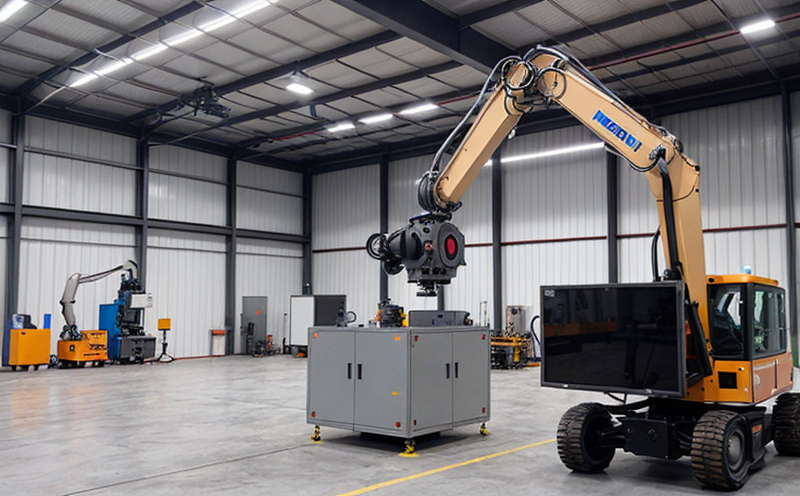ISO 15066 Collaborative Industrial Robot Safety Verification
The ISO 15066 standard provides a framework for ensuring the safety of collaborative industrial robots (CIRs) in shared workspaces with human operators. These robots are designed to operate alongside humans, enhancing productivity and versatility without compromising safety.
Collaborative industrial robotics has seen significant growth due to its ability to integrate seamlessly into existing production environments while maintaining a high level of safety. Compliance with ISO 15066 is crucial for manufacturers looking to ensure the robustness of their robots in collaborative settings, thereby avoiding potential accidents and ensuring regulatory compliance.
The standard covers various aspects including operational requirements, risk assessment procedures, and verification methods. It ensures that all components involved in a CIR system are thoroughly tested before deployment. This includes mechanical structures, sensors, control systems, software, and communication protocols. The goal is to identify potential hazards early on and mitigate them effectively.
Compliance with ISO 15066 involves several key steps: initial risk assessment, design validation testing, operational safety checks, and periodic re-assessment post-deployment. Each step focuses on identifying risks associated with the robot's operation within a collaborative environment and ensuring that these risks are managed appropriately.
For instance, during the initial phase of development, thorough mechanical stress tests might be conducted to simulate real-world conditions that could cause failure under extreme circumstances. Similarly, sensory systems would undergo extensive calibration checks to guarantee accurate detection of proximity changes, which is critical for avoiding collisions between humans and robots.
The verification process also includes software testing where algorithms are scrutinized for any flaws or vulnerabilities that could lead to unsafe behavior. This comprehensive approach ensures not only the mechanical integrity but also the overall functionality and reliability of collaborative industrial robots.
Compliance with ISO 15066 is essential for manufacturers seeking certification from third-party organizations, as it demonstrates adherence to internationally recognized safety standards. Such certifications are increasingly becoming prerequisites in many industries, particularly those involving heavy machinery or hazardous materials handling.
In summary, ISO 15066 plays a pivotal role in fostering safer collaborative industrial robotics by providing a structured methodology for assessing and mitigating risks associated with these advanced technologies. By following this standard, manufacturers can confidently deploy robots that work harmoniously alongside human workers while minimizing the risk of accidents or injuries.
Benefits
Enhanced safety in collaborative environments by identifying and mitigating potential risks early on.
Increased confidence among end-users regarding the reliability and robustness of their robotic systems.
Facilitates easier regulatory compliance with international standards, thus opening up markets to global trade.
Promotes innovation by providing a clear roadmap for safe design and development practices.
Simplifies the process of obtaining third-party certification, reducing time-to-market for new products.
Reduces liability risks associated with accidents involving collaborative industrial robots.
Improves brand reputation by demonstrating a commitment to safety and quality.
Supports continuous improvement through periodic re-assessment and updating of safety measures.
Eurolab Advantages
Eurolab offers unparalleled expertise in the field of industrial robotics, with a team of highly qualified professionals dedicated to providing top-notch testing services. Our state-of-the-art facilities are equipped with cutting-edge technology that allows us to conduct rigorous and accurate tests according to the latest international standards.
We employ skilled engineers who have extensive experience in both theoretical knowledge and practical application of robotic systems. They understand the intricacies involved in designing safe collaborative robots, enabling them to provide precise testing solutions tailored specifically for your needs.
Our comprehensive suite of services includes initial risk assessments, detailed design validation tests, operational safety checks, and periodic re-assessments post-deployment. With our advanced instrumentation, we can simulate real-world scenarios accurately, ensuring that every aspect of the robot’s behavior is thoroughly examined.
The use of standardized test protocols based on ISO 15066 guarantees consistent results across different batches or models of robots produced by various manufacturers. This consistency helps maintain quality control throughout production processes, reducing variability and improving overall product reliability.
Moreover, our experienced staff can provide expert advice during the early stages of development when decisions about design choices have significant impacts on safety outcomes. They offer insights into best practices that ensure compliance with applicable regulations right from the start, saving time and resources later down the line.
In addition to technical proficiency, Eurolab prides itself on delivering exceptional customer service. We maintain open lines of communication throughout each project, ensuring that clients are fully informed about progress and any issues encountered during testing. Our goal is always to exceed expectations by providing reliable solutions that meet or surpass industry benchmarks.
Frequently Asked Questions
- By using standardized test protocols based on ISO 15066, which guarantees consistency in testing methods.
- This consistency helps maintain quality control throughout production processes, reducing variability and improving overall product reliability.





